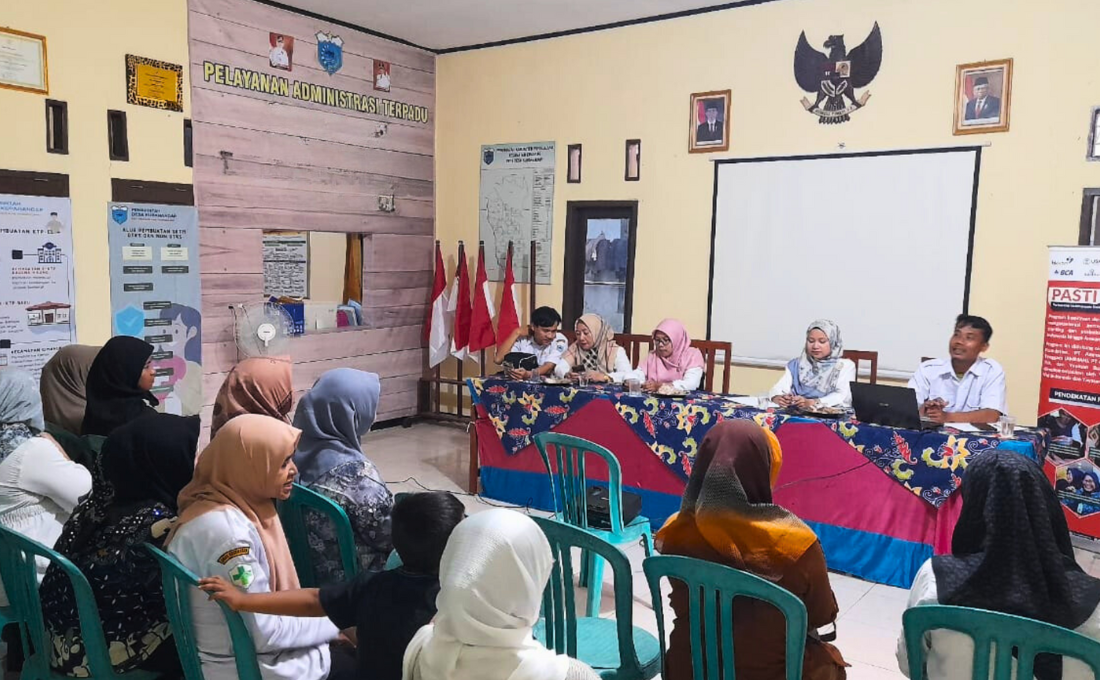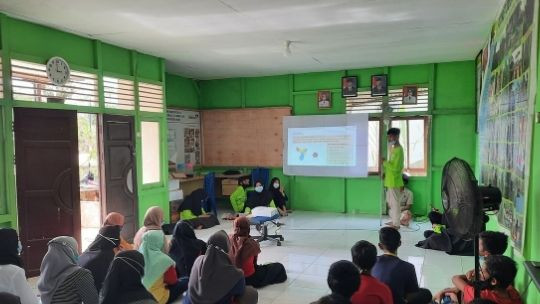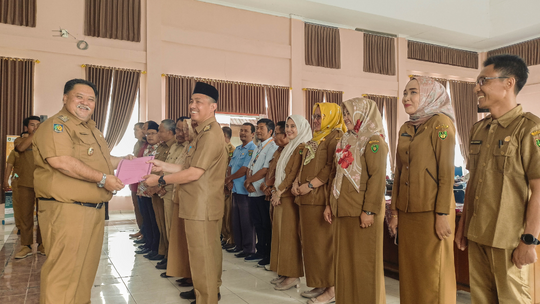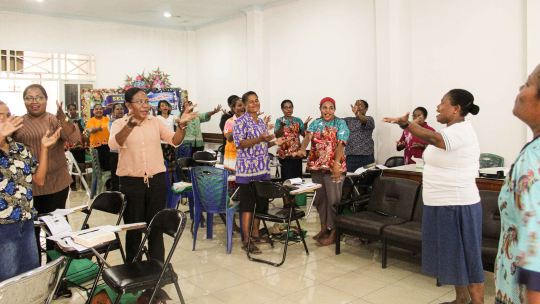Rembuk Stunting, Village TPPS in Action to Ensure Healthy and Stunting-Free Children

"I was stunned and could hardly believe it when I heard the news," shared Suga (39), the village secretary and Chair of the Village Stunting Reduction Acceleration Team (TPPS) in one of the PASTI implementation villages in Pandeglang Regency, Banten Province. He was shocked to learn that, as of 2023, there were still 40 children in his village categorized as stunted.
Determined to address this challenge, Suga and his team worked tirelessly to reduce stunting rates in their community. As Chair of TPPS, he had the opportunity to participate in capacity-building training facilitated by PASTI (Partnership to Accelerate Stunting Reduction in Indonesia). This program is a collaborative effort involving the Ministry of Population and Family Development/BKKBN, Tanoto Foundation, PT Amman Mineral Nusa Tenggara (AMMAN), PT Bank Central Asia Tbk, and Bakti Barito Foundation. It aims to accelerate stunting reduction in four Indonesian provinces: Banten, Jawa Timur, Kalimantan Barat, and Nusa Tenggara Timur. The program is implemented by Wahana Visi Indonesia and Yayasan Cipta.
Reflecting on his experience, Suga highlighted how the training empowered him and his team to carry out their duties effectively. "Addressing stunting in the village requires courage and innovation. It’s about transforming community knowledge and practices around child nutrition, promoting clean and healthy lifestyles in families, and shifting long-standing parenting habits. The PASTI training provided us with critical insights, including the importance of the Rembuk Stunting forum as a strategic tool for planning stunting reduction initiatives," he explained.
Rembuk Stunting is a meeting conducted by villages authority to discuss and formulate policies or priorities in the context of stunting prevention. Rembuk Stunting is part of the series of preparation of the village Government Work Plan (RKP) and is an activity that is required to be carried out by every village government by the Ministry of Villages and Transmigration. "In this forum, we invite experts, local government agencies, and other relevant stakeholders who can contribute ideas and proposals for addressing stunting," explained Suga.
Suga shared that the Rembuk Stunting forum was initiated when his village was designated as one of the stunting focus areas by the Pandeglang Regency government in 2023, alongside the formation of the TPPS in the village. "The timing coincided with a series of training sessions for TPPS through the PASTI program," he said. According to Suga, this was a highly advantageous opportunity. "After attending the PASTI training, we were able to immediately apply what we learned on how to organize an effective Rembuk Stunting forum," he recounted.
One of the key strategies and approaches applied by the TPPS, led by Suga, is inviting expert staff from local government agencies (OPD) at both the regency and provincial levels to participate in the Rembuk Stunting forum held at the beginning of each year. The goal is to map out potential resources and foster collaboration among stakeholders to address the factors contributing to stunting in the village. "As a result, in 2023, several government agencies committed to supporting us, starting from providing clean water infrastructure, training community members to become nutrition advocates, assisting with food supplies for supplementary feeding activities, and even providing fish seedlings for the village to manage as a local protein source," he explained.
In addition to OPD, the village government is also involved in the Rembuk Stunting forum. According to Suga, this involvement is crucial for ensuring that TPPS shares the same vision and commitment with the village government in accelerating stunting reduction. "This strategy has indirectly opened the village government's eyes to the fact that stunting is a real issue that needs to be addressed concretely," he explained. The proposals and potential programs emerging from the Rembuk Stunting forum are followed up, organized, and adjusted to the available budget during the TPPS coordination meetings. Afterward, Suga and his team present the outcomes of these coordination meetings at the Village Government Work Plan (RKP-Des) meeting, where TPPS is invited by the village government.
The approach and strategies implemented by Suga and his team have encouraged the village government to allocate part of its budget for accelerating stunting reduction. "The amount has increased from around IDR 15 million in 2023 to IDR 17 million in 2024," he said.
The budget is managed for various activities aimed at accelerating stunting reduction in the village. Among these is the Pos Gizi DASHAT (PGD) nutrition intervention for children under-two in the village. PGD is a nutritional intervention innovation from PASTI, which adapts two existing community interventions: Pos Gizi and DASHAT.
Pos Gizi is a supplementary feeding activity that provides nutrient-dense meals using local food ingredients, combined with education on good feeding practices, parenting, hygiene, and seeking healthcare services for parents. This program is carried out intensively for 12 consecutive days. The target participants are children under-two who are underweight or have not gained weight in the past two months at the Posyandu (2T), but are not currently ill.
Meanwhile, DASHAT is a community empowerment activity aimed at ensuring balanced nutrition for families at risk of stunting, utilizing local resources through education and promoting healthy family consumption patterns. Children under-two with underweight status or those who have failed to gain weight in two consecutive weight measurements (2T) will transition to the DASHAT program after completing the 12-day Pos Gizi class. The DASHAT program includes a 90-day monitoring period, with weekly educational class meetings. Children with one instance of no weight gain (1T) can also join the DASHAT classes. During the program, the child's weight will be monitored every 30 days by volunteers and community health workers through Posyandu activities.
The integration of Pos Gizi and DASHAT into a comprehensive model aims to reach more families and support nutritional fulfillment during the First 1,000 Days of Life (1,000 HPK). Several components in the implementation of PGD are funded using the village budget. "This includes transportation support for PGD volunteers, refresher training for the volunteers, and the provision of some supporting equipment for PGD," said Suga.
Nok (50), one of the PGD volunteers in the village, stated that the village's support in organizing PGD is highly meaningful. According to her, the attention from the village has greatly motivated the volunteers, especially as the results of the PGD have significantly improved the weight of the children who participated. "PGD is not just about feeding. It also teaches participants to change parenting and feeding practices for their children," she said.
The support from PASTI for the TPPS in a village in Pandeglang Regency, Banten, has not only had a significant impact on the implementation of PGD and improved child health in the village but also led the village to receive recognition from the Secretariat of the Vice President of the Republic of Indonesia in September 2024. The award was given because the village was considered to have performed well in reducing the stunting rate to 0 children with stunting status in 2024, as mentioned during the National Coordination Meeting (Rakornas). " The award is a result from the capacity building provided by PASTI. It’s encourage us to carry out stunting prevention initiatives and innovations by collaborating with various sectors," concluded Suga.
Efforts of the PASTI program
The PASTI program's efforts in accelerating stunting reduction in Indonesia are ongoing. In addition to nutritional interventions and capacity building for adolescents, another approach being implemented is enhancing the capacity of the Stunting Acceleration Task Force (TPPS). Since its implementation in 2023, the PASTI program has successfully built the capacity of 1,100 members from 242 TPPS at the village/sub-district level and 192 members from 27 TPPS at the district level. As outlined in Presidential Regulation Number 72 of 2021, TPPS is the body mandated to coordinate, synchronize, and evaluate the effective implementation of stunting reduction efforts.
Author: Nana Rahmat, PASTI District Coordinator - Pandeglang
Editor: PASTI Communications Unit



